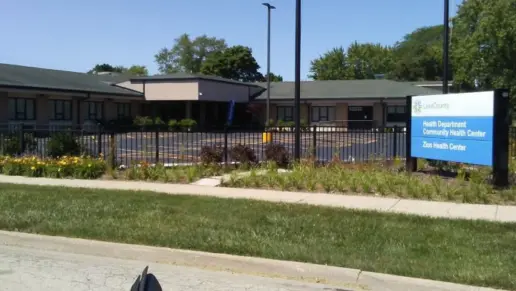About Thresholds – Kedzie Avenue
Thresholds is a provider of clinical services for folks with severe mental illness. They offer everything from case management to psychiatric care. One of their core offerings is substance use disorder treatment for individuals struggling with addiction and dual diagnosis.
They serve Chicago, Illinois residents out of multiple locations including one on Kedzie Avenue. Threshold services are typically covered by Medicaid, Medicare and private insurance. They also provide discounted fees for select clients.
Proven Substance Use Treatments in Chicago
The Thresholds substance use treatment program is designed to empower clients to develop practical skills, set life goals and get the education and support they need for long term recovery..
I like that they focus on proven treatments for addiction such as exercise and dieting, motivational interviewing, and medication-assisted treatment (MAT). All clients will have an admissions assessment to figure out their treatment needs and right level of care.
A Range of Therapy Services
Treatment is individualized and could include a variety of therapy services such as group and individual counseling, case management and recovery coaching. With recovery coaching, you can be connected with an individual who has experience with healing from addiction and provide personal insight and encouragement to support your recovery. Along with therapy services, clients can also receive DUI services if needed.
The facility is not far from various attractions that you can enjoy in the Chicago area. Outside of your treatment sessions, you can visit places such as The Art Institute of Chicago and Millennium Park.
Rehab Score
Other Forms of Payment
Medicaid is a state based program that helps lower-income individuals and families pay for healthcare. Medicaid covers addiction treatment so those enrolled can use their coverage to pay for rehab. When a program accepts Medicaid the client often pays very little or nothing out of their own pocket.
Private insurance refers to any kind of healthcare coverage that isn't from the state or federal government. This includes individual and family plans offered by an employer or purchased from the Insurance Marketplace. Every plan will have different requirements and out of pocket costs so be sure to get the full details before you start treatment.
Self-pay involves paying for treatment out of your own pocket. You can use savings or credit, get a personal loan, or receive help from family and friends to fund your treatment. If you don't have insurance or your insurance plan doesn't cover a specific program, self-pay can help ensure you still get the care you need.
Medicare is a federal program that provides health insurance for those 65 and older. It also serves people under 65 with chronic and disabling health challenges. To use Medicare for addiction treatment you need to find a program that accepts Medicare and is in network with your plan. Out of pocket costs and preauthorization requirements vary, so always check with your provider.
Addiction Treatments
Levels of Care
 Outpatient
Outpatient
Treatments
Many of those suffering from addiction also suffer from mental or emotional illnesses like schizophrenia, bipolar disorder, depression, or anxiety disorders. Rehab and other substance abuse facilities treating those with a dual diagnosis or co-occurring disorder administer psychiatric treatment to address the person's mental health issue in addition to drug and alcohol rehabilitation.
Mental health rehabs focus on helping individuals recover from mental illnesses like bipolar disorder, clinical depression, anxiety disorders, schizophrenia, and more. Mental health professionals at these facilities are trained to understand and treat mental health issues, both in individual and group settings.
Programs

Adult Program

Young Adult Program
Clinical Services
Cognitive Behavioral Therapy (CBT) is a therapy modality that focuses on the relationship between one's thoughts, feelings, and behaviors. It is used to establish and allow for healthy responses to thoughts and feelings (instead of unhealthy responses, like using drugs or alcohol). CBT has been proven effective for recovering addicts of all kinds, and is used to strengthen a patient's own self-awareness and ability to self-regulate. CBT allows individuals to monitor their own emotional state, become more adept at communicating with others, and manage stress without needing to engage in substance abuse.
Dialectical Behavior Therapy (DBT) is a modified form of Cognitive Behavioral Therapy (CBT), a treatment designed to help people understand and ultimately affect the relationship between their thoughts, feelings, and behaviors. DBT is often used for individuals who struggle with self-harm behaviors, such as self-mutilation (cutting) and suicidal thoughts, urges, or attempts. It has been proven clinically effective for those who struggle with out-of-control emotions and mental health illnesses like Borderline Personality Disorder.
Group therapy is any therapeutic work that happens in a group (not one-on-one). There are a number of different group therapy modalities, including support groups, experiential therapy, psycho-education, and more. Group therapy involves treatment as well as processing interaction between group members.
In individual therapy, a patient meets one-on-one with a trained psychologist or counselor. Therapy is a pivotal part of effective substance abuse treatment, as it often covers root causes of addiction, including challenges faced by the patient in their social, family, and work/school life.
Trauma therapy addresses traumatic incidents from a client's past that are likely affecting their present-day experience. Trauma is often one of the primary triggers and potential causes of addiction, and can stem from child sexual abuse, domestic violence, having a parent with a mental illness, losing one or both parents at a young age, teenage or adult sexual assault, or any number of other factors. The purpose of trauma therapy is to allow a patient to process trauma and move through and past it, with the help of trained and compassionate mental health professionals.
Staff
Mark Ishaug, M.A
CEO
Mark Furlong, L.C.S.W
COO
Debbie Pavick, L.C.S.W
Chief Clinical Officer
Brent Peterson
Chief Development Officer
Al Shoreibah, C.P.A., M.B.A
CFO
Ademola Dayo Popoola
CIO
Steve Weinstein, M.D
Medical Director
J Wesley Cook, D.O
Chief Medical Officer
Contact Information
3638 South Kedzie Avenue
Chicago, IL 60632


